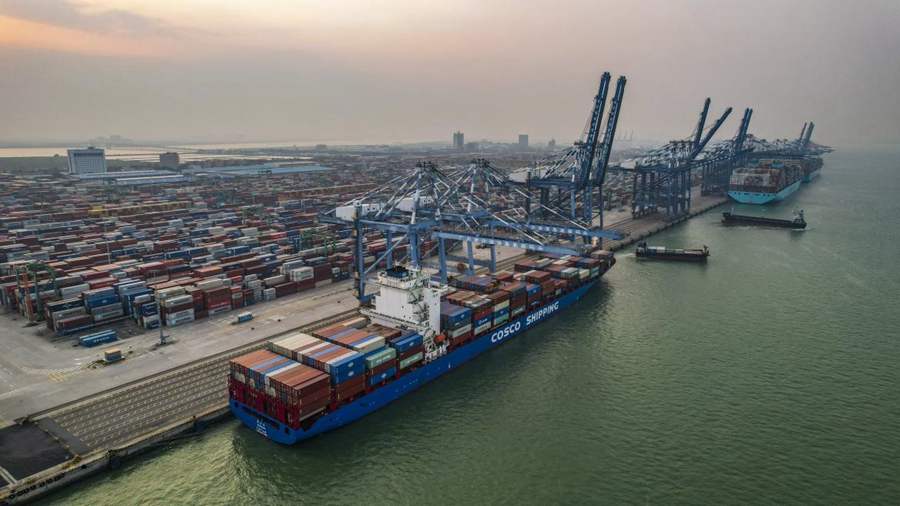Nansha district in Guangzhou drives high-quality development with innovation
 |
| Containers are loaded onto a cargo ship at a terminal in Nansha district, Guangzhou, capital of south China’s Guangdong province, Sept. 12, 2021. (People’s Daily Online/Ye Bingxin) |
With a designed top speed of 160 km per hour, Guangzhou Metro Line 18 in south China’s Guangdong province, hailed as the fastest subway in the Guangdong-Hong Kong-Macao Greater Bay Area, impressed passengers with advanced facilities and smart services during its first trial run on Sept. 16.
After the north-south arterial subway line of Guangzhou is put into operation this year, it will shorten the travel time between downtown Guangzhou and the city’s only subcenter Nansha district to about 30 minutes, and make Nansha more closely connected with Zhuhai and other cities in the Greater Bay Area.
As China recently issued new plans for the construction of the Greater Bay Area, including upgrading Hengqin New Area and expanding Qianhai Shenzhen-Hong Kong Modern Service Industry Cooperation Zone in Guangdong, Nansha, which is a key part of the free trade zones in the Greater Bay Area, has also embraced new opportunities.
Industry insiders believe that the areas of free trade zones in the Greater Bay Area, including Nansha, Hengqin, and Qianhai, will generate stronger driving forces for high-quality development because of resource convergence. Faster development of the Greater Bay Area will certainly bring greater opportunities to the market.
Statistics suggest that Nansha registered a regional GDP of nearly 94.59 billion yuan (about $14.64 billion) during the first half of the year, a year-on-year increase of 15 percent. From January to July, the district’s value of foreign trade accounted for 24.4 percent of the city’s total.
In recent years, Nansha has stepped up efforts to form an innovation-driven model for high-quality development. It has achieved 719 innovations, received incentives from the inspection teams of the State Council for business system reform, fiscal management and economical and intensive use of land, and ranked high among China’s national-level new areas in terms of business environment, laying a solid foundation for its high-quality development and helping gradually develop the Greater Bay Area into an innovation highland.
A total of 40,534 companies were set up in Nansha during the first seven months of the year, an increase of 1.07 times from the same period in 2020, according to Dong Ke, district mayor of Nansha district.
In the meantime, the district introduced 20 new investment projects from Fortune Global 500 companies, signed and kicked off 150 key projects worth over 450 billion yuan, enjoying strong momentum of development, Dong added.
Not long ago, Guangzhou OED Technologies Co., Ltd. and Fuzhou Soarfree Information Technology Co., Ltd. jointly hosted a product launch event in Nansha, during which they showcased their latest 6.3 mm electronic shelf label solution that requires no power supply and reprintable electronic paper.
In fact, such innovative products have continuously emerged in Nansha, behind which lie Nansha’s efforts to underpin high-quality development with sci-tech innovation.
The Nansha Science City, with a planned area of 99 sq. km, has become a major part of the comprehensive national science center of the Greater Bay Area.
The Southern Marine Science and Engineering Guangdong Laboratory (Guangzhou) in Nansha district has gathered 52 high-level scientific research teams made up of more than 1,000 personnel in marine field, including 17 teams led by academicians.
The branch of China State Shipbuilding Corporation Limited in Guangzhou has seen its production capacity of shipbuilding and marine engineering equipment reach 5.58 million tons, becoming one of the country’s three largest shipbuilding bases.
Automobile makers Toyota and Hycan have jointly launched a production base project in Nansha, aiming to foster a new energy automobile industry cluster worth over 100 billion yuan; and Cloudwalk, a Nansha-based AI enterprise, became a unicorn in the industry in less than three years.
Nansha has basically established an industrial chain of third-generation semiconductor industry, and witnessed rapid growth of leading companies like APT Electronics Co., Ltd. and AccoPower Semiconductor Ltd.
Besides, a batch of innovation-driven pharmaceutical companies based in Nansha district, including MingMed Biotechnology Co., Ltd. and TCRCure Biopharma Ltd., have made major breakthroughs in the research and development of medicines.
To attract more talents and motivate companies to innovate and build a cradle of original innovation, Nansha has rolled out a package of policies, including providing a maximum of 200 million yuan of financial support for each scientific research platform and high-caliber talents a settling-in allowance of up to 10 million yuan.
Since the permanent venue for science forum of the Greater Bay Area was located in Nansha, the district has gathered pace in integrating into the global innovation network and formed an innovation landscape featuring the Nansha Science City, Nansha International Financial Island, science forum of the Greater Bay Area and International Special Talent Zone, becoming a key driver of innovation in the Greater Bay Area.
 |
Photos
 Bumper harvest presents a magnificent scene of terraced rice paddies in SW China's Luzhou city
Bumper harvest presents a magnificent scene of terraced rice paddies in SW China's Luzhou city In pics: life of Siberian tigers in NE China's breeding center
In pics: life of Siberian tigers in NE China's breeding center Explore wonderland created by an alpine lake cluster in SW China's Yunnan
Explore wonderland created by an alpine lake cluster in SW China's Yunnan In pics: Museums across China unveil creative and culturally-inspired mooncakes
In pics: Museums across China unveil creative and culturally-inspired mooncakes
Related Stories
- WIPO expert says China is becoming a global innovation leader
- China edging closer to top 10 most innovative economies: WIPO
- China is now window to future, says French daily
- Science award signals China's inroads on frontier of 'deep blue'
- Central authorities' measures benefit Hong Kong's I&T development: HKSAR official
Copyright © 2021 People's Daily Online. All Rights Reserved.






